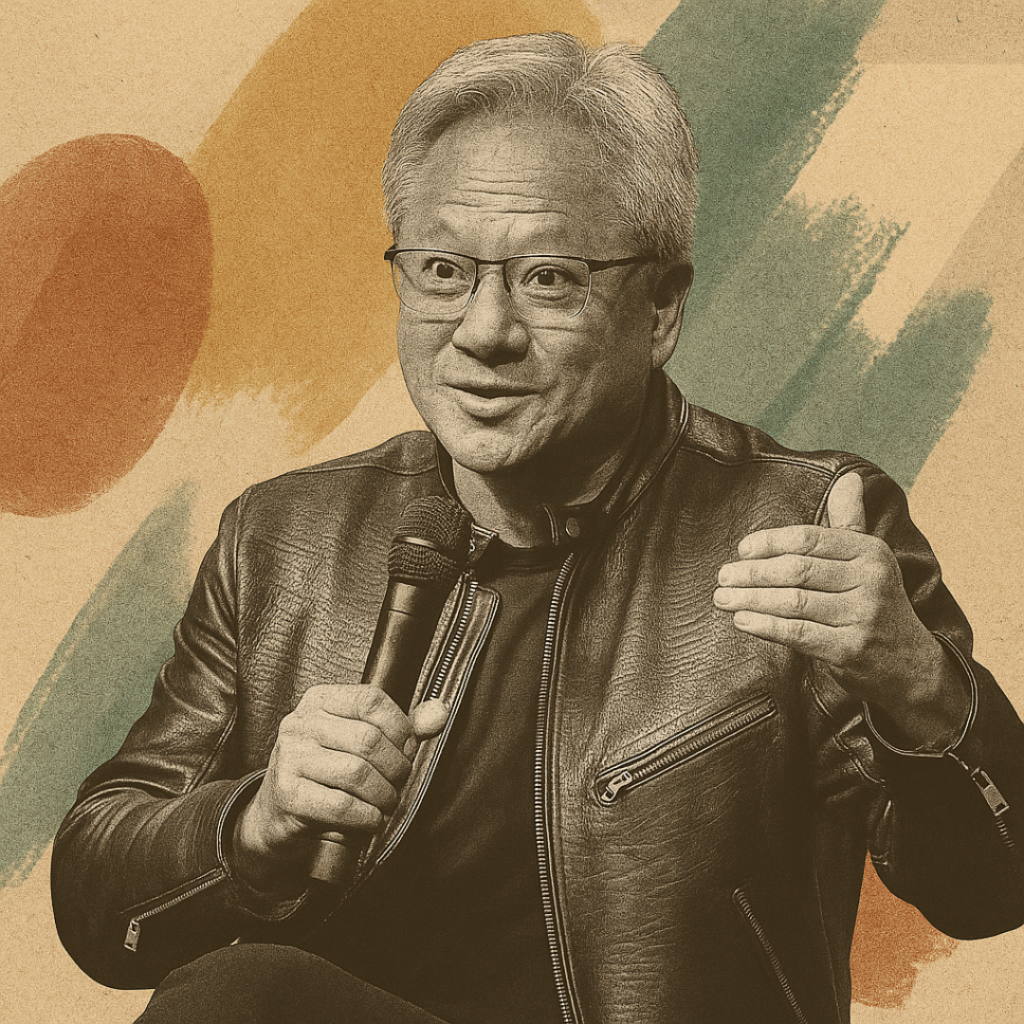
Jensen Huang: Betting it all on AI, plus putting some NVIDIA chips into philanthropy
Jensen Huang, co-founder and CEO of NVIDIA, is one of a handful of people who can realistically tell us where AI will be in the next ten years. That’s because NVIDIA, firmly in the trillion-dollar club, is heavily invested. Huang, the company’s CEO since its inception, is the man of the hour, making headlines as he advises world leaders on the new economy, powered by AI. This case study dives into Huang’s early life, how NVIDIA happened, his optimism about AI, and how his private wealth is distributed, including his philanthropy arm, the Jen-Hsun & Lori Huang Foundation, which has recently expanded its focus to include AI-driven health research.

The Jen-Hsun & Lori Huang Foundation, established in 2007, is a private family foundation based in Palo Alto, California. It was founded by Jen-Hsun (Jensen) Huang, the CEO of NVIDIA, and his wife, Lori Huang. The foundation focuses on philanthropy in higher education, public health, STEM initiatives, and community organisations, particularly on the West Coast and in the San Francisco Bay Area. As a private family foundation, it maintains a low profile.
About the Company
The Jen-Hsun & Lori Huang Foundation
- Location Palo Alto, California
- Type Philanthropic Foundation
- Founded 2007
Early life and education
An immigrant to the US, Jensen Huang was born in Taiwan in 1963. His family first relocated to Thailand and then later to the United States when he was just nine years old. Huang grew up in Oregon, where he graduated from Aloha High School. During his teenage years, he worked as a dishwasher, busboy, and waiter at a Denny’s restaurant.
Pursuing higher education, he earned a bachelor’s degree in electrical engineering from Oregon State University in 1984. During his time at Oregon State, he met Lori Mills, who happened to be his lab partner in an engineering course. After doing homework together on Sundays, the couple married in 1988.
In 1992, Jensen Huang went on to complete his Master’s in Electrical Engineering from Stanford University. Today, Jensen and Lori Huang have two children together, Madison and Spencer. Madison Huang is the Director of Product Strategy for NVIDIA Omniverse, and their son Spencer Huang is a Product Manager working on NVIDIA’s AI developer ecosystem.
Founding NVIDIA
Jensen Huang’s first job after graduating with his bachelor’s was at Advanced Micro Devices (AMD), where he worked as a product engineer designing and testing microchips. His early focus on memory and microprocessors gave him a head start in Silicon Valley’s semiconductor industry.
In 1993, in what seemed like a full-circle moment, Huang met fellow engineers Chris Malachowsky and Curtis Priem at a Denny’s restaurant to sketch the idea that became NVIDIA. When they incorporated the company (named from the Latin invidia, meaning “envy”), their mission was simple: to transform 2D gaming graphics into the immersive 3D visuals we now take for granted.
By the late 1990s, NVIDIA’s RIVA 128 and GeForce 256 had coined the term “graphics processing unit” and made the firm a leader in gaming technology. In the 2000s, CUDA (Compute Unified Device Architecture) turned GPUs into general-purpose computing tools, laying the foundation for modern AI.
The 2020s brought another leap with the Hopper and Blackwell GPU architectures, now powering the world’s largest AI models through partnerships with OpenAI, Anthropic, xAI, and Google DeepMind. While early NVIDIA GPUs helped enable OpenAI’s first experiments, the company’s role was one of supplying critical compute, not “gifting” hardware as sometimes claimed.
Today, Huang’s focus is on “physical AI” — the intelligent machines that will perceive, reason, and act in the real world. He predicts that within a decade, AI will be embedded in everything we own, from humanoid robots to autonomous vehicles and everyday devices.
From gaming to global AI
Under Huang’s leadership, NVIDIA stock has surged more than 2,000% over the past decade amid the global AI boom, placing his net worth at around $150 billion in late 2025. However, he maintains that this is only the beginning. Huang estimates that AI-driven robotics and automation could represent a $50 trillion global opportunity, creating entirely new industries and reshaping existing ones.
As an AI optimist, Huang believes that artificial intelligence will permeate every aspect of daily life, much like electricity or the internet once did. He often notes that a few decades ago, people had to take classes to learn basic computing, yet today, engaging with AI is as simple as opening an app. To accelerate adoption, he encourages individuals and organisations to “just start using it,” arguing that familiarity breeds understanding.
AI capital and stewardship
Compared to many billionaires, Huang is known for his modest lifestyle. There are no superyachts or private space ventures tied to his name. Instead, the vast majority of his wealth remains concentrated in his NVIDIA shareholding, where he owns roughly 859 million shares — about 3.5% of the company.
With NVIDIA briefly surpassing a $5 trillion market cap in October 2025, Huang’s net worth rose to an estimated $145–150 billion, placing him among the top five richest individuals globally. Roughly one-tenth of his stake is held directly, while the rest sits in long-term trusts and partnership structures designed for family succession and philanthropic continuity.
Jensen and Lori Huang also established the Jen-Hsun & Lori Huang Foundation in 2007, based in Palo Alto. The foundation now controls an estimated 69 million NVIDIA shares (worth over $10 billion), making it one of the largest private family foundations in the United States by assets.
The Jen-Hsun & Lori Huang Foundation
The Jen-Hsun & Lori Huang Foundation operates independently, without additional board members or staff. It maintains a discreet presence, with no official website or public grant application process. The foundation focuses on philanthropy in higher education, public health, AI-enabled medical research, STEM advancement, and community development, particularly on the West Coast and within the San Francisco Bay Area. In 2024, it announced a $100 million donation to the University of California, San Francisco (UCSF) to accelerate biomedical research through AI and advanced computing.
The Huangs place particular emphasis on institutions that shaped their own journeys. Notable donations include:
Oregon State University (OSU): In 2022, the Huangs donated $50 million to their alma mater to establish the Jen-Hsun and Lori Huang Collaborative Innovation Complex, an AI-powered research hub designed to inspire new generations of engineers and technologists.
Stanford University: Jensen Huang donated $30 million to build the Jen-Hsun Huang Engineering Centre, which now serves as a global hub for problem-solving and interdisciplinary collaboration.
Oneida Baptist Institute: In 2019, the foundation donated $2 million to fund Jen-Hsun Huang Hall, a girls’ dormitory and classroom complex in Kentucky, honouring the school Huang attended as a young immigrant.
Reflecting on his personal journey, Huang tells 60 Minutes interviewer Bill Whitaker:
“It is the most extraordinary thing, Bill, that a normal dishwasher, bus boy could grow up to be this. There’s no magic, it’s just 61 years of hard work every single day. I don’t think there’s anything more than that.” – Jensen Huang, NVIDIA CEO.
The Simple take
At 62, Jensen Huang is arguably Silicon Valley’s most in-demand voice on artificial intelligence. Dressed in his signature black leather jacket, the engineer-turned-visionary sees AI as a multi-trillion-dollar transformation, positioning NVIDIA as the world’s core infrastructure provider for intelligent computing. When he speaks, his passion is unmistakable. His wealth remains deeply tied to NVIDIA, where both of his children contribute to the company’s AI and Omniverse initiatives. If his vision for the next decade holds true, Huang’s 3.5% stake could make him the first engineer-CEO to surpass $200 billion in net worth, a reflection of how central AI has become to the modern economy.
Further Reading

Transforming family office operations with Eton Solutions: Shade Tree Advisors’ AI journey
WealthTechLike many single and multi-family offices, Shade Tree Advisors faced the burdensome task of managing a high volume of custodian account statements across multiple custodians and hundreds of client relationships and legal entities. This process demanded significant manual effort each month. In seeking a scalable solution, they encountered a fragmented vendor landscape, where most providers […]

Peter Thiel’s capital stack: A contrarian view for family offices
InvestmentsPeter Thiel is one of Silicon Valley’s most influential and polarising figures. A billionaire investor, PayPal co-founder, and early Facebook backer, he is also the driving force behind Palantir and Founders Fund. Known for his contrarian worldview and libertarian ideology, Thiel has built a layered approach to managing his wealth. His method blends operating companies, […]

From fragmentation to focus: A $200M portfolio transformation
Technology StacksA UK-based multi-generational single-family office managing over $200 million faced challenges managing its complex portfolio spread across multiple continents and assets. As their sophisticated investments exceeded the limits of their operational infrastructure, they partnered with IQ-EQ to develop a tailored solution. This case study outlines how IQ-EQ helped them shift from a reactive to a […]

The hidden drains on family office portfolios and how to stop them
Listed Stocks & BondsWhen Greenlock started working with funds, a single-family office client asked them to audit their structure. At first, everything looked standard — until they stumbled upon a curious share class. The minimum investment was just $10k, designed for plain-vanilla retail investors with the highest regulatory protection and enormous embedded retrocessions. Clearly, it was not a […]